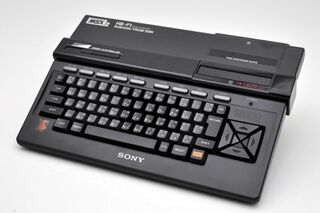Difference between revisions of "MSX"
From Sega Retro
m (image) |
|||
| (2 intermediate revisions by 2 users not shown) | |||
| Line 1: | Line 1: | ||
{{ConsoleBob | {{ConsoleBob | ||
| − | | | + | | logo=MSX logo.svg |
| − | | consoleimage= | + | | consoleimage=MSX2.jpg |
| − | |||
| name= | | name= | ||
| maker=Microsoft | | maker=Microsoft | ||
| Line 26: | Line 25: | ||
==List of Sega games for the MSX== | ==List of Sega games for the MSX== | ||
| − | ===MSX=== | + | ===MSX (Europe)=== |
{{multicol| | {{multicol| | ||
*''[[Buck Rogers: Planet of Zoom]]'' (1983) | *''[[Buck Rogers: Planet of Zoom]]'' (1983) | ||
*''[[Congo Bongo]]'' (1983) | *''[[Congo Bongo]]'' (1983) | ||
| + | *''[[Zaxxon (home computers)|Zaxxon]]'' (1985) | ||
| + | *''[[OutRun (home computers)|OutRun]]'' (1987) | ||
| + | *''[[After Burner (home computers)|After Burner]]'' (1988) | ||
| + | *''[[Passing Shot]]'' (1988) | ||
| + | *''[[Thunder Blade (home computers)|Thunder Blade]]'' (1988) | ||
| + | *''[[Alien Syndrome (home computers)|Alien Syndrome]]'' (1988) | ||
| + | *''[[Time Scanner]]'' (1989) | ||
| + | *''[[Scramble Spirits]]'' (1989) | ||
| + | *''[[Shinobi (home computers)|Shinobi]]'' (1989) | ||
| + | *''[[Altered Beast (home computers)|Altered Beast]]'' (1989) | ||
| + | *''[[Power Drift]]'' (1989) | ||
| + | *''[[Space Harrier II (home computers)|Space Harrier II]]'' (1990) | ||
| + | |cols=3}} | ||
| + | |||
| + | ===MSX (Japan)=== | ||
| + | {{multicol| | ||
*''[[Astron Belt]]'' (1984) | *''[[Astron Belt]]'' (1984) | ||
*''[[Ali Baba and 40 Thieves]]'' (1984) | *''[[Ali Baba and 40 Thieves]]'' (1984) | ||
| Line 49: | Line 64: | ||
*''[[Fantasy Zone]]'' (1987) | *''[[Fantasy Zone]]'' (1987) | ||
*''[[High School! Kimengumi]]'' (1987) | *''[[High School! Kimengumi]]'' (1987) | ||
| − | |||
| − | |||
| − | |||
| − | |||
| − | |||
| − | |||
| − | |||
| − | |||
| − | |||
| − | |||
| − | |||
|cols=3}} | |cols=3}} | ||
Latest revision as of 16:49, 2 November 2024

|

|
| MSX |
|---|
| Manufacturer: Microsoft |
| Variants: MSX2 |
The MSX is an 8-bit home microcomputer standard announced in 1983. Led by Microsoft of Japan (now ASCII), the MSX concept was to create a standard format for computers, thus eliminating customer confusion and compatibility issues which were ripe in the early 1980s.
There are hundreds of MSX compatible machines from numerous manufacturers, sold all over the world between late 1983 and 1995 with varying degrees of success. The format was most successful in its home market of Japan, where over 5 million units were sold, but also sold well in European markets such as Spain, with its design greatly influencing the market as a whole.
Contents
Sega support

Like all home computers prior the rise of IBM PC compatibles running Windows 95 (and excluding the Sega-designed SC-3000), Sega did not bring any of its games to the MSX directly, instead licensing out properties to third-party publishers (usually Pony Canyon in Japan, and the likes of U.S. Gold in Europe). However, while MSX computers were sold across the world, software was often rooted to one region, so the MSX library intended for European markets (sold on cassette) is entirely different to the intended library for Japan (sold on cartridge).
In Japan, the MSX briefly competed directly with Sega's SC-3000, and so Sega games did not appear on the rival platform until 1984/1985, when SC-3000 sales were beginning to dwindle. From a hardware perspective, the SC-3000 and MSX standard are broadly similar, meaning most MSX conversions are almost identical to their SC-3000 counterparts. By 1987, however, Sega were invested in the Sega Mark III console and were seemingly less willing to supply Pony Canyon with the rights to create more Sega conversions.
This means that while the MSX is typically thought of as a Japanese machine, MSX titles based on more advanced Sega properties were exclusive to Europe, in which, similar to other home computer platforms, MSX publishing rights were picked up by companies such as U.S. Gold and Activision (Mediagenic). Unlike many of the competing systems, however, the MSX was not considered profitable in most European countries, and so fewer ports were commercially released. Those which were were usually intended for a Spanish audience - the main MSX market in Europe, or were released some months after other systems.
As a result of the MSX failing to do particularly well in Europe, few European-developed games played to the system's strengths, with titles often being ported from the ZX Spectrum. Like the Spectrum, the MSX exhibits "colour clash", with each 8x8 background tile only supporting up to two colours, however the MSX can overcome this limitation with its built-in hardware sprites (of which the Spectrum does not have). While this usually leads to the MSX conversion having slightly better visuals, MSX optimisation was not always a priority, meaning titles can both look identical to their Spectrum counterparts, while also managing to run slower.
A small handful of games were released for the updated MSX2 specification in Japan, and Astron Belt is notable for being one of the few MSX titles to make use of LaserDisc technology.
List of Sega games for the MSX
MSX (Europe)
- Buck Rogers: Planet of Zoom (1983)
- Congo Bongo (1983)
- Zaxxon (1985)
- OutRun (1987)
- After Burner (1988)
- Passing Shot (1988)
- Thunder Blade (1988)
- Alien Syndrome (1988)
- Time Scanner (1989)
- Scramble Spirits (1989)
- Shinobi (1989)
- Altered Beast (1989)
- Power Drift (1989)
- Space Harrier II (1990)
MSX (Japan)
- Astron Belt (1984)
- Ali Baba and 40 Thieves (1984)
- Champion Boxing (1985)
- Champion Pro Wrestling (1985)
- Champion Soccer (1985)
- Doki Doki Penguin Land (1985)
- GP World (1985)
- Zaxxon (1985)
- Zoom 909 (1985)
- Bank Panic (1986)
- Champion Ice Hockey (1986)
- Champion Kendo (1986)
- Flicky (1986)
- Gulkave (1986)
- Hang-On (1986)
- Ninja Princess (1986)
- Robo Wres 2001 (1986)
- Fantasy Zone (1987)
- High School! Kimengumi (1987)
MSX2
- OutRun (1988)
- Fantasy Zone II: The Tears of Opa-Opa (1989)
- Columns (1990)
Other MSX games also released for Sega systems
MSX
- Ace of Aces
- Ali Baba and 40 Thieves
- Antarctic Adventure
- Boggy '84
- Bomberman Special
- Bouken Roman
- Budokan: The Martial Spirit
- C So!
- Cabbage Patch Kids
- California Games
- Chack'n Pop
- Championship Lode Runner
- Choplifter
- Circus Charlie
- City Connection
- Cobra Command
- Comic Bakery
- Con-Dori
- Dig Dug
- Double Dragon
- Double Dragon II: The Revenge
- Dr. Hello
- E.I.: Exa Innova
- Eagles 5
- Elevator Action
- Exerion
- F-1 Spirit: The Way to Formula-1
- F-15 Strike Eagle
- F-16 Fighter
- FA Tetris
- Flashpoint
- Formation Z
- Frogger
- Gangcheol RoboCop
- Gauntlet
- Genei Toshi
- Genghis Khan II: Clan of the Gray Wolf
- Ghostbusters
- Golvellius
- Gunship
- H.E.R.O.
- Hustle Chumy
- Hyper Sports 2
- Indiana Jones and the Last Crusade
- Ishin no Arashi
- Klax
- Knightmare
- Lode Runner
- Magical Kid Wiz
- Magical Tree
- Mappy
- Miracle Warriors: Seal of the Dark Lord
- Mr. Do's Wild Ride
- New Boggle Boggle 2
- Nobunaga's Ambition
- Operation Wolf
- Pac-Man
- Pac-Mania
- Ping-Pong
- Pippols
- Pitfall II: The Lost Caverns
- Pooyan
- Power Strike
- Psychic World
- Psychic World
- R-Type
- Rally-X
- Road Avenger
- Road Fighter
- Rock n' Bolt
- Sega-Galaga
- Solitaire Poker
- Soukoban
- Space Invaders
- Spelunker
- Star Force
- Star Soldier
- Suikoden: Tenmei no Chikai
- Super Bioman I
- Super Boy 3
- Super Boy II
- Takahashi Meijin no Bouken Jima
- The Black Onyx
- The Castle
- The Duel: Test Drive II
- The Flintstones
- The Legend of Kage
- The Protector
- The Three Dragon Story
- Time Gal
- TwinBee
- Vigilante
- World Games
- Yami no Ryuuou: Hades no Monshou
- Yie Ar Kung-Fu
- Yie Ar Kung-Fu II
- Zanac
MSX2
- Block Hole
- Bubble Bobble
- Carbuncle Pi
- Cloud Master
- Dragon Slayer: The Legend of Heroes
- Gemfire
- HardBall!
- Heroes of the Lance
- Ishido: The Way of Stones
- Madou Monogatari 1-2-3
- Madou Monogatari 1-2-3 PRV: Madou Monogatari Ondo: M. Jackson mo Bikkuri
- Master of Monsters
- Might and Magic: Gates to Another World
- Nobunaga no Yabou Returns
- Nobunaga no Yabou Sengoku Gunyuuden
- Nobunaga no Yabou: Bushou Fuuunroku
- Operation Europe: Path to Victory 1939-45
- P.T.O.: Pacific Theater of Operations
- Pac-Mania
- Psy-O-Blade
- Puyo Puyo
- Puyo Puyo Koi Monogatari
- Rastan
- Romance of the Three Kingdoms II
- Shanghai
- Shikinjoh
- Snatcher
- Sorcerian
- Super Daisenryaku
- Ultima IV: Quest of the Avatar
- Uncharted Waters
- Undeadline
- Wonderland of Carbuncle
- Ys III: Wanderers from Ys
- Ys: Ancient Ys Vanished Omen